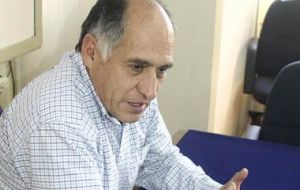MercoPress. South Atlantic News Agency
India’s giant iron ore project in Bolivia stalled; China also interested
 Bolivian Mines minister Jose Pimentel
Bolivian Mines minister Jose Pimentel Bolivia and India’s Jindal Steel & Power one of the world’s leading steel manufacturers are scheduled to sign an addendum to the contract for the exploitation of the Mutún iron ore reserves with the purpose of unlocking the “lack of investments” according to Mines minister Jose Pimentel.
Pimentel said this would be the first step to have the document become a bill, which ‘should help solve all the problems and excuses for the lack of investments”. Once the addendum is signed and becomes into law “the Bolivian government expects that Jindal will immediately begin” with the promised investments.
Relations with the Indian corporation froze when the Bolivian government decided to cash the 18 million US dollars guarantee deposit for the steel project in the eastern state of Santa Cruz, next to Brazil and home to one of the world’s largest unexploited iron ore deposits, alleging Jindal was behind its promised investments’ timetable.
Bolivia and Jindal singed in 2007 a contract for the exploitation of 50% of the Mutún deposits with estimated reserves of 40 billion tons of iron ore and manganese.
The Bolivian Mines ministry accused Jindal of having only invested 12 of the promised 600 million US dollars, and the corporation at the time accepted “it has a limited execution” of the project because of the delay from the Bolivian government in delivering the land involved.
However Pimentel said that only 13% of the land had not been delivered, and therefore “this was not a valid excuse”.
Pimentel said that in ongoing talks with the company since March it was agreed that once these problems are behind the investment in the next four years of 1.5 billion US dollars will begin. “This means that is all works out as planned by 2014 Bolivia could be producing steel”.
The minister also said that Bolivia was willing to exploit the whole El Mutun deposits and already had firm interests from China and South Korea.
The Bolivian government is known to be already negotiating with China Development Bank, which has offered the state 15 billion US dollars to develop the remaining El Mutun iron-ore deposit concession.
A Jindal spokesperson in Bolivia was quoted last week in the Bolivia’s BNamericas saying that the company believes that Sergio Alandia, the interim president of Bolivian state steelmaker Empresa Siderurgica El Mutun (Esem), is obstructing the development of the El Mutun iron ore deposit and steel project.
Esem was created in 2007 by the Bolivian government to sign the contract with JSPL and oversee the El Mutun project. It also gave Esem special powers to sign agreements with other mining companies.
“We have been very respectful and loyal to our partner and, in particular, to the Bolivian state, and even more so to the Bolivian people. However, since October - when Alandia was appointed interim president - the relationship has become complicated and led to the current situation,” Jindal spokesperson Rene Soria told BNamericas.
Soria even went so far as to say that although JSPL is willing to go ahead with the project, the company is finding it difficult to proceed since Alandia has created obstacles and behaved in a unilateral and arbitrary manner, even disregarding the authority of the Bolivian president.
Under the joint venture agreement, Jindal was required to invest 300 million USD each year of the first five-year period and 200 million annually over the next three years, amounting to a total direct investment of 2.1 billion over eight years.
JSPL was supposed to have exported up to 10 million tons of iron ore last year and build a 10 MTPA pellet plant, a 6 MTPA sponge iron plant, 1.7 MTPA steel plant and a 450 MV power plant under the contract.
But the Bolivian government argues that Jindal has not made the necessary investments in the project and neither has iron ore mining nor the steel plant operations have started as scheduled.
JSPL has been trying to negotiate with Esem to alter the contract since the land allocated for mining has still not been cleared of indigenous inhabiting the area. The company also says that there is no infrastructure to transport the ore to the nearest port at Puerto Busch, which itself is under construction. Furthermore there is no power in the area to operate the steel plant and the government has refused to subsidise the 180 million USD natural gas needed to run the steel plant.




Top Comments
Disclaimer & comment rules-

Read all commentsWhy would any company (or country) invest in Bolivia when the president president has shown every sign of government takeover of all business? Sounds like a losing proposition to me!
Jun 15th, 2010 - 08:58 pm 0Commenting for this story is now closed.
If you have a Facebook account, become a fan and comment on our Facebook Page!